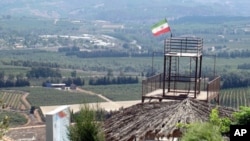The revived Middle East Peace talks are focused exclusively on the Israeli-Palestinian conflict. But there are other key actors in the search for an overall peace between Israel and its neighbors.
There is a pretty park on a hillside overlooking Israeli farmland. Children climb atop a playground equipment here, while adults sit at a picnic table nearby. There would be nothing remarkable about the scene, except the park is in Lebanon and the flag flying above it is Iran's.
The Islamic Republic, whose leaders say the Israeli state must disappear from the map, gave the garden to the people of southern Lebanon after the 2006 conflict between Israel and Iran's proxy in Lebanon, the militant Shi'ite group Hezbollah.
Role of Hezbollah
The park is one transparent display of money spent in the south since the war. The truckloads of cash handed out by Hezbollah after the war for reconstruction and getting businesses running again is widely believed to have come from Iran.
More difficult to assess are the funds given to keep Hezbollah, which runs much of the south, armed.
Paul Salem, director of the Carnegie Middle East Center in Beirut, says the group has a wide range of short, medium and long-range missiles, although the exact number and what Hezbollah intends to do with them is unclear.
"Who's to say? But apparently, they have a massive capacity to harm Israel through missile systems. Now Hezbollah doesn't want to repeat what happened in 2006. They do not want a war with Israel, if they can help it," he said.
Although Hezbollah claimed victory in that conflict, Lebanon paid a heavy price, and Hezbollah was largely blamed. Cluster bombs still mar the countryside and an estimated 200,000 people remain internally displaced.
Salem argues that Hezbollah has evolved dramatically from the revolutionary Islamist model of its creators to a more integrated part of Lebanon's multi-religious society. Its past attacks on American targets have earned it a place on the U.S. list of terrorist groups. But Hezbollah also holds seats in parliament and ministerial posts in the Lebanese government. And it is continuing its social work, running hospitals, schools - even organic farms.
Signs of normality
Such activities have helped make the past four years ones of relative calm. Among the surprising signs of normality is a young English actor, star of a popular children's movie series, vacationing at the elegant villa of his grandfather, a British-Lebanese historian who lives part-time in what has been referred to as "Hezbollahland."
The quiet is attributed in part to a boosted presence of the United Nations peacekeeping mission, UNIFIL, after 2006, and a return of the Lebanese Armed Forces, or LAF, to the area after an absence of decades.
"The situation has been one of the calmest periods in recent history, and also the relation and coordination with the LAF has been good. And as an important part of this cooperation is that recently the Lebanese Army has also decided to enhance its strength in the south, adding an additional brigade," said UNIFIL spokesman, Andrea Tenenti.
Lebanese Army involvement
But it was the Lebanese Army, not Hezbollah, that was involved in the most serious incident of recent years -- a firefight with Israel last month over the demarcation of the Blue Line. A senior Israeli military officer, three Lebanese soldiers and a journalist were killed.
Despite what was seen as the Lebanese Army's mishandling of the confrontation, its willingness to take on its much better-equipped neighbor raised the idea that it could perhaps undercut Hezbollah's main argument for maintaining its vast arsenal -- national defense.
Retired Lebanese General Elias Hanna says it is unlikely that the army will replace Hezbollah any time soon, not only because he says it is ill-prepared.
"Is there some competition between Hezbollah and the army? For sure, because if you have an army similar to Hezbollah and ready to defend, you don't need Hezbollah. But Hezbollah, really is connected to regional issues, and Hezbollah says it from time to time, the 'Axis of Resistance' -- Lebanon, Syria and Iran," he said.
Iran and regional issues
One of Iran's more immediate regional issues is the possibility of an Israeli airstrike on its nuclear facilities. Israel, along with the United States and other nations, say Iran is seeking to build nuclear weapons, with Israel as an obvious target.
Paul Salem of the Carnegie Middle East Center says that if Israel were to carry out a pre-emptive strike, Iran's only real way to retaliate would be through Hezbollah.
"Now, is anybody happy about that? Are Lebanese happy about that? No. But did Iran arm this force for years and spend hundreds of millions of dollars on this force so as not to be used when they want it? No. That is not the case," he said.
Salem says Iran is not going to allow "a few Lebanese" to block its retaliation for any Israeli attack.




